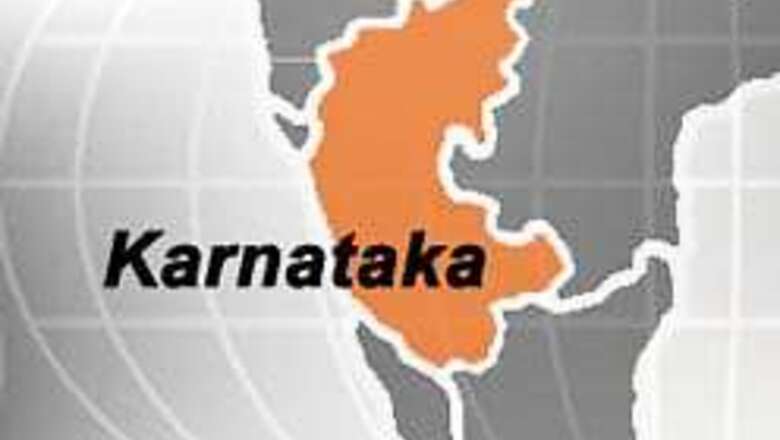
views
Bangalore/New Delhi: The Karnataka electorate that voted in three phases to elect a new state assembly would not have imagined that its decision, perhaps for the first time in the state's history, could have a national impact.
The results of the voting by around 65 per cent of the 42 million voters for the 224-member assembly on May 10, 16 and 22 will be out Sunday. Political circles at both the state and national levels have already begun assessing the possible influence the outcome will have on the timing of the parliamentary polls, due early next year.
The Sunday outcome is crucial for both the Congress and the Bharatiya Janata Party (BJP) to help them draw strategies for the assembly elections in Delhi, Rajasthan, Madhya Pradesh and Chhattisgarh later this year and the parliamentary polls early next year.
For the Congress, which is leading the United Progressive Alliance (UPA) coalition government at New Delhi, its performance in Karnataka, particularly in farmers-dominated rural areas, will indicate whether the massive Rs 71,860 crore/ Rs 718 billion package to free a large section of farmers from their debt burden has yielded any positive impact.
If it manages to notch up the right numbers in the Karnataka polls, the Congress will heave a sigh of relief for doing well despite rising food prices and runaway inflation.
The BJP, if its luck holds out and it is able to come to power in Karnataka, will make a political debut in the South. While the party has been able to establish its sway in the North, the southern states have remained outside its ambit.
Karnataka is the first state where elections were held after re-carving of the assembly and parliamentary constituencies in line with the recommendations of the Delimitation Commission headed by Kuldip Singh, a retired judge of the Supreme Court.
The polling took place amidst a sudden spurt in the rate of inflation, making rising prices an added issue to the election plank of the three main contenders for power - the Congress, the BJP and the Janata Dal-Secular.
When the Election Commission announced the poll schedule for Karnataka in April, the issue of inflation was not at all on the radar of the political parties. The issues under a scanner were mainly political stability and the need to improve infrastructure, particularly in the state capital and India's silicon hub Bangalore.
The re-drawing of assembly contours without affecting the total number of seats in the assembly is expected to benefit the Congress as the number of seats reserved for the Scheduled Castes has gone up by three seats, from 33 to 36, and the Scheduled Tribes by 13 seats, from two to 15. Of the 28 Lok Sabha (lower house of the Indian parliament) seats in Karnataka, the number of seats reserved for SC has gone up by one, from four to five, and there will be two seats for ST for the first time.
The BJP hopes to benefit from the increase in the number of constituencies in Bangalore, from 16 to 28, as it believes that it has always fared well in urban areas.
In urban areas like Bangalore, the results will show how far the Congress has succeeded in exploiting the resentment of the people over crumbling infrastructure.
The Congress will also be able to assess how its young mascot, party general secretary Rahul Gandhi, is faring as a vote-catcher. This is the third state election in which the son of Congress president Sonia Gandhi has campaigned. Earlier he had campaigned in the Uttar Pradesh and Gujarat polls but that did not benefit the Congress in electoral terms.
Rahul, who had come to Karnataka before the poll schedule was announced in April as part of his 'Discover India' tour, skipped the campaign for the first phase held on May 10. He addressed several meetings for the second and third phases whereas Sonia Gandhi visited the state once each for the three phases.
The BJP's campaign in Karnataka has swung from one issue to another. The party began by harping on the 'betrayal' by Janata Dal-Secular, which refused to support the BJP when its turn came to form a government.
Keeping true to the terms of agreement, the BJP had however earlier supported a Janata Dal-Secular led government for 20 months.
Down the line of its campaign the BJP shifted gear and highlighted the threat from terrorism - from there it swung to inflation as its graph began to rise.
The results Sunday will help the BJP to define the issues of its electoral campaign for the 2009 general election.
The third major player in Karnataka, the Janata Dal-Secular, was under fire from both the Congress and the BJP in the election campaign. It ignored the BJP taunts of 'betrayal' and the Congress' barbs for being indifferent to Bangalore's desperate need for better infrastructure.
Though headed by H. D. Deve Gowda, former prime minister, the Janata Dal-Secular played the regional card,telling the voters that national parties have always shortchanged Karnataka and favoured neighboring states whether on the issue of sharing Cauvery water with Tamil Nadu, or the dispute over Belgaum with Maharashtra. Or in allocating funds for flood and drought relief - sanctioning central grants for industrial and infrastructure development.
The poll outcome Sunday could well make both the BJP, bidding for power in Karnataka and New Delhi, and the Congress aiming to retain power in New Delhi, re-work its strategies from scratch.



















Comments
0 comment